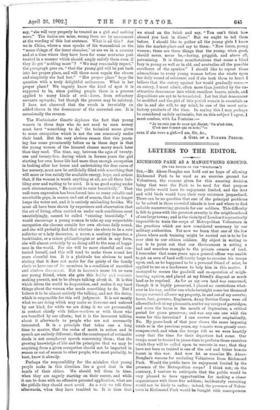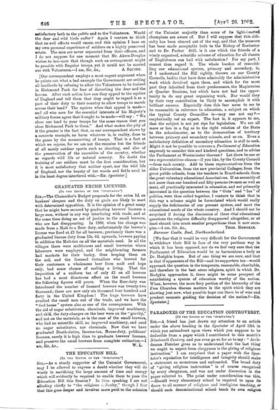LETTERS TO THE EDITOR.
RICHMOND PARK AS A MANCRTIVRING GROUND.
[TO Ma EDITOR. OF THE " SPECTATOR:1
SIE,—Mr. Akers-Douglas can hold out no hope of allowing Richmond Park to be used as an exercise ground for Volunteers, the reasons given for this amazing decision being that were the Park to be used for that purpose the public would have its enjoyment limited, and the deer and wild birds would have their very existence jeopardised. There cams be no question that one of the principal problems to be solved in these crowded islands is bow and where to find suitable manceuvring grounds for our soldiers. This difficulty is felt to press with the greatest severity in the neighbourhood of our large towns ; and in the vicinity of London it is practically impossible to train the corps of Metropolitan Volunteers in the practices which are now considered necessary by our military authorities. Yet now we learn that one of the few places where such training might be carried out is to be for ever shut to our citizen soldiers. My object in writing to you is to point out that our Government is setting a bad and senseless example to the private owners of land. I remember that some years ago a general officer was unable to get an area of land sufficiently large to exercise his troops upon, and, as he happened to be a personal friend of mine, he applied to me as a landowner to help him in this matter. I managed to secure the goodwill and co-operation of neigh- bouring squires, and placed at my friend's disposal as much land as he required. As far as my own land was concerned, though it is highly preserved, I placed no restrictions what- ever in his way, and for one whole fortnight some ten thousand troops careered all over my property, in and out of my coverts; horse, foot, gunners, Engineers, Army Service Corps were all allowed to look at my pheasants, scatter my coveys of partridges, and scare the hares in the month of September, a critical period for game preserves ; and was any one one whit the worse for this incursion ? I can answer most emphatically, No. My game-book of that year shows the same imposing totals as in the previous years, my tenants were grossly over- compensated, and when the troops left us we were heartily sorry that the time for their departure had come. Our troops must be trained in peace-time to perform those exercises which they will be called upon to execute in war ; that they have not been so trained is one of the sad and bitter lessons learnt in this war. And now let us examine Mr. Akers- Douglas's reasons for excluding Volunteers from Richmond Park. Would the public have its enjoyment limited by the presence of the Metropolitan corps ? I think not; on the contrary, I venture to anticipate that the public would be very pleased to have opportunities for making a closer acquaintance with these fine soldiers; incidentally recruiting would not be likely to suffer ; indeed, the presence of Volun- teers in Richmond Park would be fraught with consequences
satisfactory both to the public and to the Volunteers. Would the deer and wild birds suffer ? Again I venture to think that no evil effects would ensue, and this opinion 'I base on my own personal experience of soldiers on a highly preserved estate. The men are never separated from their officers, and I do not suppose for one moment that Mr. Akers-Douglas wishes to insiuuate that though such an arrangement might be possible with Regular troops, yet it could not be carried
out with Volunteers.-1 am, Sir, &c., A SQUIRE.
[Our correspondent employs a most cogent argument when be points out what a bad example the Government are setting all landlords by refusing to allow the Volunteers to be trained in Richmond Park for fear of disturbing the deer and the herons. After such action how can they appeal to the squires of England and tell them that they ought to regard it as a part of their duty to their country to allow troops to march across their land ? The squires when that appeal is made— and all who care for the essential interests of his Majesty's military forces agree that it ought to be made—will say : "We close our land to your troops for the same reason that you close Richmond Park to them." And what makes the pity of it the greater is the fact that, as our correspondent shows by a concrete example, no harm whatever is, in reality, done to the game by the manaluvring of troops. That is a fact at which we rejoice, for we are not the enemies but the friends of all manly outdoor sports such as shooting, and also of the preservation of the amenities of the country, whether as regards wild life or natural scenery. No doubt the training of our soldiers must be the first consideration, but it is most satisfactory that neither sport, nor the wild life of England, nor the beauty of her woods and fields need be in the least degree interfered with.—En. Spectator.)



























































 Previous page
Previous page